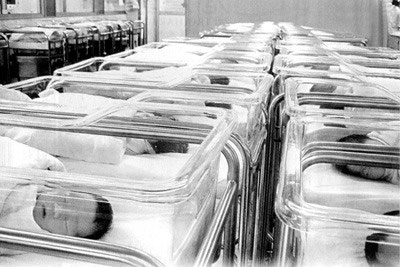HK tightens rules for mainland mums
By Joseph Li (China Daily)Updated: 2006-12-22 07:43
 Newborns at a private hospital in Hong Kong. [file]  |
HONG KONG: The Hospital Authority (HA) will double fees for mainland mothers giving birth in Hong Kong and withhold birth information until all fees are paid in a bid to cut down on the delinquent medical bills that have been straining the special administrative region's healthcare system.
The measures, part of a collection of new rules released yesterday, were aimed at combating problems arising from the large number of mainland mothers who default on payments after giving birth in public hospitals. Many mothers from the mainland travel to Hong Kong to give birth in order to secure a Hong Kong identity card for their children.
The HA's board yesterday endorsed a package of measures proposed by its Administration and Operations Committee (AOM) to deal with the growing problem, which has not only caused huge financial losses, but also increased the workload of hospital workers and deprived local mothers of services.
The HA board has approved a fee-increase for the three-days-two-nights package for obstetric patients to HK$39,000 (US$5,000) from HK$20,000 (US$2,564). The package includes a pre-natal examination.
The authority also encouraged expecting mothers from the mainland to have pre-natal examinations prior to coming to Hong Kong. Those who fail to do so will be subject to a surcharge of HK$9,000 (US$1,153).
Also, HA Chairman Anthony Wu said the administration would not turn over information on babies born to mainland mothers to the Birth Registry before the mothers had paid their hospital bills in full.
By law, such information must be passed to the Birth Registry within 42 days, meaning the HA will have to release the birth information after the 43rd day.
"We hope this will be a little bit of a deterrent. If mainland mothers do not settle their bills, they will have to stay in the hospitals longer and will not be allowed to leave Hong Kong," said Wu.
In addition, defaulting mainland mothers will be denied other services, with the exception of emergency services, when they return to Hong Kong. They will also be subject to administrative fees on top of their original bills. The AOM has also discussed the possibility of hiring international debt-collection companies to recover their money from delinquent mainland mothers.
"We will invite tenders in the first quarter of 2007 to cover debt collection before deciding whether to take the matter forward," he said. "In the opinion of some board members, the chance of getting the money back from the mainland is very slim, and they are also concerned that the administrative fee involved will be very high."
HA Chief Executive Shane Solomon said the goal of the package was to give top priority to local mothers as well as to help the HA better handle demand for medical services.
"Our proposals should encourage non-eligible mainland mothers to have a well-planned or pre-booked approach to allow our staff to be prepared to respond quickly," he said.
To address the problem of manpower shortages, the HA is preparing to launch a large-scale recruitment programme. The goal is to hire 40-50 experienced midwives to take up full-time and part-time work at higher pay levels. Also, nurses in the obstetric and neo-natal intensive care units will receive overtime allowances in lieu of time off in order to ease the workload.
The arrangement is expected to cost HK$65 million (US$8.3 million), said Cheung Wai-lun, the HA's director of cluster services.
"When we increased the fee for the first three days of hospitalization for mainland mothers to HK$20,000 (US$2,564) in September 2005, it yielded an immediate impact on demand, which dropped by 20 per cent per month for 10 months from December 2005. but the trend was not sustainable. But I have to add that 85 per cent of the mainland mothers have paid their bills," Wu said.
"As to the additional expenditure, we hope the growth in the number of patients will partly defray the amount, and we will also discuss with the government the possibility of new funding in the form of a non-recurrent expenditure."
(China Daily 12/22/2006 page3)
|
||
|
||
|
|